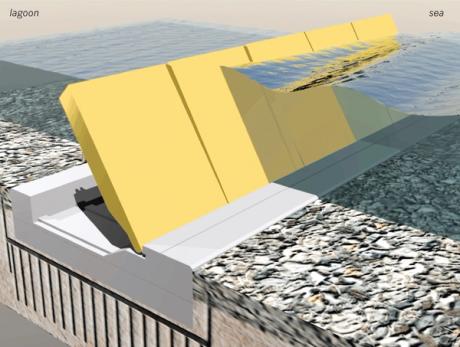
Maybe after all there is hope that Venice will survive into the next century. On June 1, for the very first time, at a conference organized by the new Fondazione Venezia Capitale Mondiale della Sostenibilità/Venice Sustainability Foundation (VSF), politicians (well, ex-politicians, but important public figures) admitted that sea level rise is the main problem facing the city today.
So far, the dozens of conferences held in Venice since 2000 have tended to be of two kinds: scientists talking to other scientists, often about the coming catastrophe, but completely ignored by the authorities; and symposia on the social, economic and cultural aspects of the city, today and tomorrow, completely ignoring the fact that Venice will have no tomorrow unless measures are taken to prevent its inevitable attrition by rising waters .
This conference, entitled “Mose and the others: international defenses against floods” and orchestrated by Pierpaolo Campostrini, general director of Corila, the scientific organization coordinating research on the Venice lagoon, was opened by Renato Brunetta, Minister of public administration in the governments of Silvio Berlusconi and Mario Draghi, and president of VSF.
He celebrated the successful completion of the so-called Mose mobile barriers, which have already been closed 50 times against floods since 2020. This vast project, fiercely fought in the 1990s by the Left and Green parties and highly politicized, took 17 years to become operational and cost 6.5 billion euros, of which perhaps as much as half a billion euros was due to corruption which poisoned relations with the central government and the Venetians.
More dangerously, it has led to the suppression of the truth that Mose is the means to protect the city from temporary flooding, but not from chronic sea level rise. This partly explains why it is not listed on Italian politicians’ to-do list, national or local.
Pride of the Flood Barrier
So the first step must have been to exorcise Mose’s bad reputation and make everyone feel good about finally stopping the flood. That was the message from Brunetta and closing speaker Costa, a former public works minister, EU transport commissioner and mayor of Venice, who told the audience that Italy should be proud: Mose should be added to the list. Unesco World Heritage monuments, he said; its know-how should be offered for free to the world during COP28 in Dubai. Flood specialists in attendance from the UK, the Netherlands and Galveston, Texas praised Mose and described their own equivalents, the implicit message being that Mose is now a full member of the flood club. flood barriers.
Then Costa made his two radically new statements. The first was that the barriers had to be closed “as often as necessary” to prevent Venetians from getting wet, which goes against the current practice of only closing them when the water is expected to reach 130cm. or more above the level. benchmark established in 1897, when significant parts of the city were under water, especially St. Mark’s Basilica, which had to adopt separate measures to protect itself. This apparently perverse policy is to allow ships easy access to the commercial port of Marghera inside the lagoon, a point underlined earlier in the morning by Mayor Luigi Brugnaro.
Costa’s solution to these conflicting needs was to suggest a holding port outside the lagoon entrance, although he did not go into detail. Instead, he moved on to his second surprise. We are at the “post-Mose” stage; by 2100 “Venice can disappear by collapsing”, he said. Talk to The arts journalhe said, “Now we must come up with a new idea for the sake of our grandchildren and the centuries to come.”
But whose job it is to come up with this new idea is still unclear. After the meeting, Campostrini said The arts journal that the most urgent step now is for the government to appoint a head of the still unconstituted Autorità per la Laguna di Venezia, decreed in 2020 to take charge of strategic planning for the future. He added that Mose also needed funding for its maintenance and operations, and was plagued by a lack of engineering skills due to the bankruptcy of some of the companies that built it.
So it remains to be seen whether the outspokenness at the June 1 meeting will lead to action in Rome. Otherwise, VSF’s slogan, “The oldest city of the future”, risks being just a nice turn of phrase.
